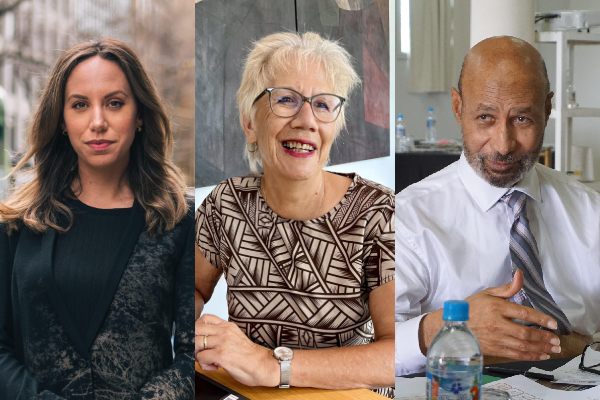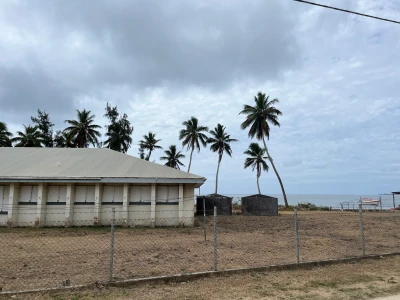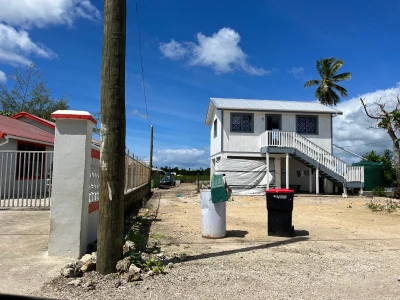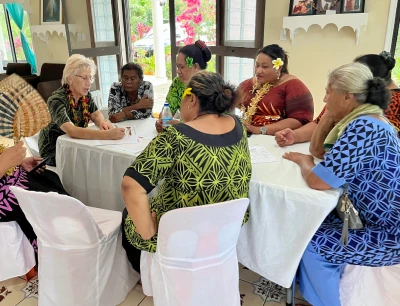New research by the University of Waikato has given policymakers the power to prepare for Pacific mobility driven by climate change.

Lead researchers Lora Vaioleti, Professor Sandy Morrison and Dr Timote Vaioleti from the University of Waikato.
University of Waikato researchers have released part two of a comprehensive report that suggests climate change is already a critical factor influencing mobility decisions both within countries and across borders.
Read Pacific Climate Change Mobility Research – Tonga and Samoa
Commissioned by the New Zealand Ministry of Foreign Affairs and Trade (MFAT) in 2022, research team Professor Sandy Morrison, Lora Vaioleti and Dr Timote Vaioleti led a two-year project on the future of climate change in Tonga and Samoa. The findings will guide New Zealand’s policies and be shared with the Tongan and Samoan governments to support their planning and action.
Key research findings revealed that families are already moving within Tonga and Samoa because of climate impacts, and in the coming five years, researchers saw a steep increase in climate change as a reason to move offshore. Further, New Zealand is already hosting families from Tonga who relocated because of climate impacts.

The now boarded up hospital in Lifuka, Ha'apai, Tonga following significant sea erosion of land. The hospital once sat 40m from the coastline and now is close to succumbing to the ocean.
“People told us that they were moving because they have lost their land to the sea, and because food is getting harder to grow. Interestingly, people also shared that they are planning five-to-10-year residences in New Zealand to fund longer-term relocation within Tonga,” Ms Vaioleti says.
It’s estimated that sea levels could rise about 30cm in Tonga and Samoa by 2050, though other sources suggest that policy makers and leaders need to consider scenarios of 1 or 2 metres.
Internal movement within these countries is already underway as people seek higher ground to relocate their home or food-growing land, but a lack of alternate land is a major risk, especially in Tonga.
Three-quarters of those surveyed in Tonga and half in Samoa said that New Zealand is their preferred overseas destination. The research also revealed how families overseas are influencing and enabling mobility and funding climate adaptation back home, which is reducing the need for some to move. The research found that key challenges post-relocation include maintaining income and dealing with psychological, emotional and spiritual impacts.

New builds on poles in the climate-exposed area of Patangata, Tonga where king tides now often flood the settled village.
The research project involved taking seven trips to Tonga and Samoa, engaging around 800 residents and 100 living overseas, and using Pacific and other innovative research methods to better understand the future scale, pattern and impact of climate change (im)mobility.
“We tapped into deeply held assumptions, fears and context through a visualisation process to reveal possible responses to different climate scenarios,” Ms Vaioleti says.
They also identified possible implications, risks and opportunities for New Zealand through conversations with eminent Māori leaders, led by Professor Morrison, and have just shared new reports focused on women, land-related risks and the overseas diaspora.
People in places like Tonga and Samoa have no choice about responding to the impacts of climate change – that decision has been made for them. So, we must focus on protecting their choices when it comes to future mobility – those who wish to stay must be supported to adapt, and we must ensure that those who move to places like New Zealand have their well-being protected. Will we prepare like we need to?
“Participants called for increased investment in easy-to-understand and ongoing awareness campaigns to support decision-making, along with ensuring, for example, that land laws are suitable for future climate scenarios.”

Professor Sandy Morrison and women in the village of Lalomanu, Aleipata district, Samoa in a dedicated women's workshop to better understand differentiated impacts of mobility on women.
Some leaders in Tonga also recommended better engagement with the overseas diaspora around future mobility and starting discussions with international partners about land for future relocation.
The MFAT programme also included research led by the University of Auckland and Mana Pacific Consultants, which examined seven other Pacific countries.



